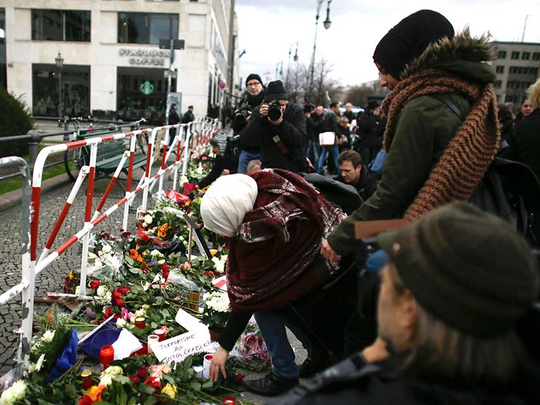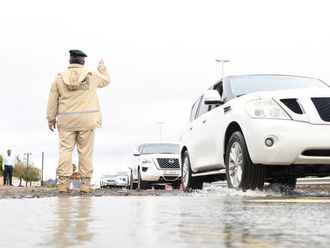
As France mourned its 130 dead in an emotional ceremony on Friday, survivors of November 13 attending on stretchers and in wheelchairs, the question of how to defeat Daesh (the self-proclaimed Islamic State of Iraq and the Levant) seemed as intractable as ever.
Francois Hollande has mounted a full-blown diplomatic effort to build a “large and single coalition”. A strong emphasis is being placed on rallying support from European states because, as the French president put it, Daesh didn’t just strike at Paris but at Europe as a whole.
Building up a unified European resolve is especially important because no one is under any illusion that the Obama administration wants to embroilitself deeper in the Middle East: America, miles across the Atlantic, simply doesn’t feel its own security is on the line. But Europe’s is. The Middle East is spewing out its violence on to the continent. Germany has announced it will contribute surveillance and refuelling planes over Syria. Eyes are now on Britain.
But what is the strategy? It is clear to all that Daesh cannot be defeated with airstrikes alone. Ground forces are needed to rout Daesh in Raqqa — its self-styled “capital of the caliphate”, in eastern Syria, and from where the Paris attacks were planned. Ground forces will also be needed for future postwar stabilisation efforts. These ground forces cannot, and should not, be western. That would invite a repetition of the costly mistakes made in Iraq and Afghanistan, where military occupation created a spiral of violence and radicalisation.
So who can be deployed against Daesh?David Cameron’s assertion in the House of Commons that 70,000 “moderate” Syrian rebels could be counted on caused raised eyebrows. As yet, no otherwestern leader has publicly made that claim. Surely, in the chaos that engulfs Syria, precise figures have to be handled with caution.
But if there is a logic to Cameron’s assertion then clues to understanding it might be found in recent talks between Hollande and Vladimir Putin. Cameron’s case for UK airstrikes wasn’t just about a national British strategy — it was obviously drawn from consultations with western allies. Cameron went to see Hollande in Paris ahead of his statement to the Commons, and ahead of the French president’s diplomatic tour, which included stops in Washington and in Moscow.
The statements that came out of those meetings didn’t provide all the answers, but they made one thing clear: how Russia acts now will decide whether an anti-Daesh strategy has any chance of success in Syria. If Russia can be made to turn the guns and missiles ofits fighter planes against Daesh — and only Daesh — an important step forward will have been taken.
New dynamics
Here’s the logic: what Cameron calls “moderate” Syrian opposition forces are anti-Al Assad rebels who currently spend most of their energy and resources resisting the onslaught of Syrian government troops who, since September, have benefitted from Russian close air support. If those rebels can be “freed” from having to fight on that front (located in the west of Syria), they would become available to move against Daesh (mostly in the east). An added and crucial advantage is that it would become much easier to rally Sunni constituencies against Daesh. The Kurds cannot be the ground force for the retaking of Raqqa or of any other important Arab-populated area. Sunni groups are the best option, but that means they need to feel empowered by new dynamics.
And here’s the problem. For the last two months Russia has been striking at the very groups Cameron and others want to see grow into an anti-Daesh ground force. The overwhelming bulk of Russia’s military involvement in Syria has been concentrated on helping Al Assad, not on fighting Daesh.
Some estimates are that 90 per cent of Russian strikes have targeted anti-Al Assad rebels, especially those the west has been trying to support. That proportion seems to have shrunk in the aftermath of the downing of a Russian passenger jet over Sinai and after the Paris attacks. But French officials indicated this week that half of Russia’s bombing is still focused on anti-Al Assad forces, not Daesh. This explains why presidents Hollande and Obama insistently called on Russia to make “a strategic shift”. So far, it is unclear if they will get it.
There is simply no agreement with Putin on what a ground strategy against Daesh should look like. That was obvious during the Putin-Hollande press conference. Nor is thereany sign of a Russian commitment not to strike at the rebelsthe west has been backing. Putin’s support for Al Assad seems entrenched: “I believe that President Al Assad’s army and he himself are our natural allies in fightingterrorism,” he said.
The only commitment Putin made was to “exchange information” with France on “areas that are held by healthy opposition, not terrorists” — areas that Russia might then “refrain from delivering airstrikes on”. Hollande was visibly tense. He repeated that Al Assad had to go “in a political transition” and stressed the key stumbling block with Putin: “I cannot but reiterate that we should support the groups that can reverse the situation on the ground and recover territory.” By that, he meant the armed Syrian opposition — the same groups Cameron mentioned.
So this is how things stand. The strategy against Daesh requires more focused and intensive airstrikes (French officials privately point to a half-baked US air campaign so far — with an average of only seven strikes a day, as opposed to 150 during Nato’s Kosovo campaign in 1999) and in parallel, ground forces must be built up. But that can only happen in a meaningful way if Russia makes its “strategic shift”. Once Russian airstrikes are directed exclusively at Daesh, prospects of a ceasefire in the civil war, as planned in the Vienna process, become slightly more realistic.
All this is extremely fragile, of course. Hollande’s hope is partly that building up European leverage might help sway Putin. Behind all the talk about cooperation with the Russian president lies a crude reality. Putin has watched from afar how his support for Al Assad has helped fuel radicalisation and Isis and consequently contributed to Europe’s weakening (the fallout from refugee flows and now terrorism). He has to weigh the cost of working against Europe in the fight against terrorism. Now is the time for Europe’s strategic awakening — because that’s the only way it will have any chance of influencing events and not crumbling beneath them. And British participation in that collective security effort is essential.
— Guardian News & Media Ltd
Natalie Nougayrede was previously executive editor and managing editor of Le Monde.










